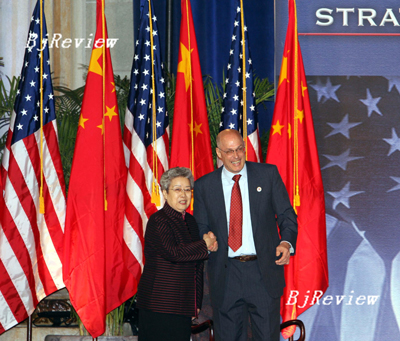
According to Ambassador Alan Holmer, Special Envoy for China and the Strategic Economic Dialogue (SED), the burning issue of food safety will take top priority during U.S. Treasury Secretary Henry Paulson's meeting with Chinese leaders early next week.
Paulson will travel to China this weekend and will meet with Chinese leaders next Tuesday and Wednesday, including President Hu Jintao and Vice Premier Wu Yi, who chairs the Chinese SED delegation.
"Product safety is a global issue that requires joint effort," Ambassador Holmer told reporters at a press briefing Thursday on Paulson's upcoming China trip.
Over the past months, China and the United States have imposed a series of tit-for-tat bans on imports of food and other products over concerns of safety. Critics warned that these bilateral trade bans might become a political tool for authorities in both countries.
"Safety requires continuous improvement," said Holmer, "but it's important that any government policies in this area be based on sound science and best possible practices. They should not be protectionist or retaliatory and should be consistent with international obligations."
Officials from the American Food and Drug Administration will also go to Beijing next week to discuss food safety issues with their Chinese counterparts.
Paulson will begin his trip with a visit to the largest lake in China, Qinghai Lake in Qinghai Province, on July 30. This highlights the importance of environmental issues in the China-U.S. SED mechanisms, even as global climate change and its impact continue to attract rising concern from world leaders.
According to Holmer, the currency imbroglio will also be high on Paulson's agenda during his discussions with President Hu and Vice Premier Wu. Holmer stated that the RMB had appreciated 9.4 percent since July 2005, but U.S. lawmakers deemed the pace to be too slow, and Paulson's failure to achieve a major breakthrough (with regard to the currency issue) at the last round of the SED talks in May prompted the United States to consider new legislative measures against China in the arena of bilateral trade.
"The Bush administration takes the issue of the exchange rate between the dollar and the RMB very seriously," said Holmer. "It is our view that China needs to do more [with regard to RMB appreciation] and to do it more quickly."
While he would not expect major breakthroughs in Paulson's upcoming China trip, Holmer spoke positively of the SED mechanism between the United States and China. "We are making progress, and we are also making that progress more quickly than we would have been without the SED," said Holmer.
He cited the civil aviation agreement as an example. "From the perspective of Secretary of Transportation Mary Peters," he said, "the agreement would not have happened had it not been for the Strategic Economic Dialogue. The SED provides a chance for leaders from both countries to meet and talk face to face so as to keep this [bilateral] relationship on an even keel."
(Reporting from New York) | 